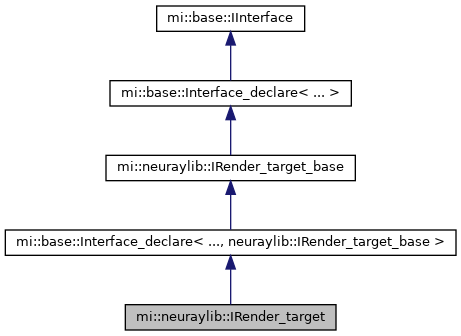Abstract interface for a render target. More...
#include <irender_target.h>

Public Member Functions | |
| virtual const ICanvas * | get_canvas (Uint32 index) const =0 |
| Returns a canvas by index. More... | |
| virtual ICanvas * | get_canvas (Uint32 index)=0 |
| Returns a canvas by index. More... | |
 Public Member Functions inherited from mi::neuraylib::IRender_target_base Public Member Functions inherited from mi::neuraylib::IRender_target_base | |
| virtual Uint32 | get_canvas_count () const =0 |
| Returns the number of canvases to render to. More... | |
| virtual Canvas_type | get_canvas_type (Uint32 index) const =0 |
| Returns the type of the given canvas. More... | |
| virtual const ICanvas_base * | get_canvas (Uint32 index) const =0 |
| Returns a canvas by index. More... | |
| virtual ICanvas_base * | get_canvas (Uint32 index)=0 |
| Returns a canvas by index. More... | |
| virtual const ICanvas_parameters * | get_canvas_parameters (Uint32 index) const =0 |
| Returns a set of parameters of the given canvas. More... | |
 Public Member Functions inherited from mi::base::IInterface Public Member Functions inherited from mi::base::IInterface | |
| virtual Uint32 | retain () const =0 |
| Increments the reference count. More... | |
| virtual Uint32 | release () const =0 |
| Decrements the reference count. More... | |
| virtual const IInterface * | get_interface (const Uuid &interface_id) const =0 |
| Acquires a const interface from another. More... | |
| template<class T> | |
| const T * | get_interface () const |
| Acquires a const interface from another. More... | |
| virtual IInterface * | get_interface (const Uuid &interface_id)=0 |
| Acquires a mutable interface from another. More... | |
| template<class T> | |
| T * | get_interface () |
| Acquires a mutable interface from another. More... | |
| virtual Uuid | get_iid () const =0 |
| Returns the interface ID of the most derived interface. More... | |
Additional Inherited Members | |
 Public Types inherited from mi::base::Interface_declare< 0xd4dff23d, ... > Public Types inherited from mi::base::Interface_declare< 0xd4dff23d, ... > | |
| typedef Interface_declare< id1, ... > | Self |
| Own type. More... | |
| typedef Uuid_t< id1, ... > | IID |
| Declares the interface ID (IID) of this interface. More... | |
 Public Types inherited from mi::base::Interface_declare< 0x8aafab6e, ... > Public Types inherited from mi::base::Interface_declare< 0x8aafab6e, ... > | |
| typedef Interface_declare< id1, ... > | Self |
| Own type. More... | |
| typedef Uuid_t< id1, ... > | IID |
| Declares the interface ID (IID) of this interface. More... | |
 Public Types inherited from mi::base::IInterface Public Types inherited from mi::base::IInterface | |
| typedef Uuid_t<0, 0, 0, 0, 0, 0, 0, 0, 0, 0, 0> | IID |
| Declares the interface ID (IID) of this interface. More... | |
 Static Public Member Functions inherited from mi::base::Interface_declare< 0xd4dff23d, ... > Static Public Member Functions inherited from mi::base::Interface_declare< 0xd4dff23d, ... > | |
| static bool | compare_iid (const Uuid &iid) |
Compares the interface ID iid against the interface ID of this interface and of its ancestors. More... | |
 Static Public Member Functions inherited from mi::base::Interface_declare< 0x8aafab6e, ... > Static Public Member Functions inherited from mi::base::Interface_declare< 0x8aafab6e, ... > | |
| static bool | compare_iid (const Uuid &iid) |
Compares the interface ID iid against the interface ID of this interface and of its ancestors. More... | |
 Static Public Member Functions inherited from mi::base::IInterface Static Public Member Functions inherited from mi::base::IInterface | |
| static bool | compare_iid (const Uuid &iid) |
Compares the interface ID iid against the interface ID of this interface. More... | |
Abstract interface for a render target.
The mi::neuraylib::IRender_target, mi::neuraylib::ICanvas, and mi::neuraylib::ITile classes are abstract interfaces which can to be implemented by the application. For example, this gives the application the ability to tailor the rendering process very specific to its needs. The render target has to be implemented by the application whereas default implementations for canvases and tiles are available from mi::neuraylib::IImage_api.
|
pure virtual |
Returns a canvas by index.
| index | The index of the requested canvas. Use mi::neuraylib::IRender_target_base::get_canvas_count() to inquire the number of canvases. |
NULL if index is out of bounds. Implements mi::neuraylib::IRender_target_base.
Returns a canvas by index.
| index | The index of the requested canvas. Use mi::neuraylib::IRender_target_base::get_canvas_count() to inquire the number of canvases. |
NULL if index is out of bounds. Implements mi::neuraylib::IRender_target_base.